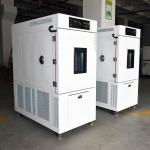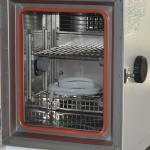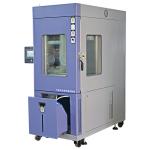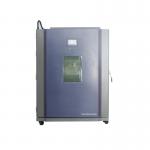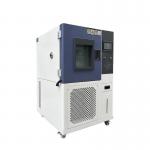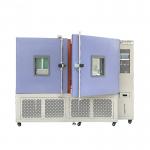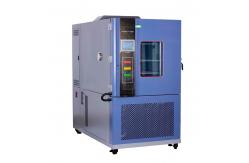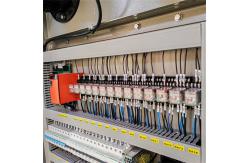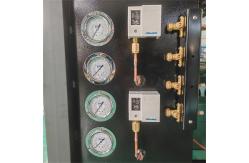In the world of modern manufacturing, research, and quality
control, the ability to accurately simulate and control temperature
and humidity conditions is crucial. The Customization 408L Control
Temperature and Humidity Test Chambers are designed to meet the
specific and often complex needs of a wide range of industries,
providing a reliable and efficient solution for testing and
analyzing the performance of various products and materials. These chambers, with a spacious 408-liter capacity, are engineered
to create and maintain highly precise temperature and humidity
levels. They serve as essential tools for industries such as
electronics, pharmaceuticals, food and beverage, automotive, and
aerospace. The primary purpose is to subject samples, components,
or finished products to controlled environmental conditions,
allowing manufacturers and researchers to evaluate their
durability, functionality, and quality. By replicating real-world
or extreme environmental scenarios, these chambers enable the
optimization of product designs, the determination of appropriate
storage and transportation conditions, and the assurance of
compliance with industry standards and regulations. - Sturdy and Insulated Construction
- The chambers are constructed with a heavy-duty framework, typically
made of high-strength steel, ensuring durability and stability. The
exterior is designed to withstand the rigors of industrial and
laboratory environments, protecting the internal components from
physical damage and external contaminants. The interior is lined
with a non-reactive and smooth surface, such as stainless steel or
a specialized polymer, to prevent any interaction between the
chamber and the tested items. High-quality insulation is
incorporated to minimize heat and moisture transfer, thereby
maintaining accurate temperature and humidity control. The door of
the chamber is engineered for a tight seal, featuring a reliable
locking mechanism and a heavy-duty gasket. It also includes a large
viewing window, usually made of tempered glass with anti-fog and
anti-scratch properties, allowing for continuous visual monitoring
of the testing process without disturbing the internal environment.
- Precision Temperature and Humidity Control Systems
- Temperature Control: The temperature control system is highly
accurate and can maintain a wide temperature range, typically from
-20°C to +80°C, with an accuracy of ±0.3°C. It utilizes advanced
refrigeration and heating technologies, along with a sophisticated
feedback loop and multiple temperature sensors strategically placed
throughout the chamber. This ensures uniform temperature
distribution and rapid temperature change capabilities, essential
for efficient testing. The system also has built-in safety features
to prevent overheating or overcooling, protecting both the tested
items and the chamber itself.
- Humidity Control: The humidity control system is equally precise,
capable of adjusting the relative humidity from 10% to 95% RH, with
an accuracy of ±2% RH. The chamber is equipped with a
high-efficiency humidifier and dehumidifier, which work in harmony
to achieve rapid and accurate humidity adjustments. Special care is
taken to prevent condensation, which could affect the test results
and damage the samples. The system also features a dew point
control function, which is crucial for maintaining the correct
moisture balance in the chamber.
- Programmability: The chamber's control panel is highly
programmable, allowing users to create and store complex
temperature and humidity profiles. This enables the simulation of a
wide variety of environmental conditions, from simple static
settings to cyclic and stepwise changes. For example, it can mimic
the temperature and humidity fluctuations that a product might
experience during a long-distance shipment or the seasonal
variations in a warehouse environment. The control panel is
user-friendly and intuitive, with a clear display that shows the
current temperature, humidity, and the status of the testing
program.
- Advanced Instrumentation and Data Acquisition
- The chambers are outfitted with a comprehensive suite of sensors.
Temperature sensors are distributed evenly to detect any
temperature gradients and ensure a homogeneous thermal environment.
Humidity sensors provide real-time data on the relative humidity
levels. These sensors are connected to a state-of-the-art data
acquisition system that records and stores all the measured data.
The data can be accessed and analyzed in real-time or retrieved
later for in-depth studies. The data acquisition system is highly
flexible and can be integrated with external software and
databases, facilitating seamless data transfer and analysis. It can
also be configured to send notifications and reports automatically,
saving time and effort for the users. Additionally, the control
panel includes built-in alarms and safety features that alert users
in case of any abnormal conditions, such as temperature or humidity
excursions outside the set limits, power failures, or equipment
malfunctions.
- Volume and Dimensions: With a volume of 408 liters, the interior dimensions are
carefully optimized to provide a spacious and efficient testing
area. The external dimensions are configured to fit within a
standard laboratory or production facility, taking into account
factors such as access, ventilation, and clearance. The chamber is
typically designed with a width of around 100 to 120 centimeters, a
depth of 100 to 120 centimeters, and a height of 120 to 150
centimeters.
- Temperature Uniformity: The temperature uniformity within the chamber is maintained
within ±0.5°C. This ensures that all parts of the tested samples
experience a similar thermal environment, which is crucial for
obtaining accurate and reliable test results.
- Humidity Uniformity: The humidity uniformity is within ±3% RH. This level of
consistency in humidity distribution allows for precise testing of
samples that are sensitive to moisture levels.
- Stability: Both the temperature and humidity stability are excellent, with
minimal fluctuations over time. This allows for long-term testing
and the evaluation of a sample's performance under stable
environmental conditions, as well as its ability to withstand
changes over extended periods.
- Accurate Simulation of Environmental Conditions
- The primary function of these chambers is to provide a highly
accurate and realistic simulation of specific temperature and
humidity conditions. By precisely controlling these parameters, it
allows users to evaluate how products and samples will behave in
various real-world situations. For example, in the electronics
industry, it can test the performance of circuit boards and
components under different temperature and humidity levels,
identifying potential issues such as corrosion or component
failure. In the pharmaceutical industry, it can assess the
stability of drugs and their packaging under specific environmental
conditions, ensuring product quality and safety.
- The ability to create complex environmental profiles, such as
cyclic temperature and humidity changes, is also a valuable
function. This can help in uncovering potential weaknesses or
failure points in products that may not be evident under static
conditions. For instance, a product that is exposed to daily
temperature and humidity cycles may experience stress-induced
damage over time, and these chambers can accurately replicate such
scenarios.
- Enhanced Product Quality and Research Capabilities
- Through comprehensive testing in the chambers, manufacturers can
identify and address potential issues in their products. If a
product shows signs of degradation or failure under specific
temperature and humidity conditions, appropriate measures can be
taken, such as modifying the design, changing the material
composition, or improving the manufacturing process. This leads to
the development of more stable and reliable products, reducing the
risk of failures and recalls. In the research field, it allows for
the exploration of new materials and the understanding of their
properties under different environmental conditions, which can lead
to significant scientific breakthroughs.
- The test chambers also serve as a valuable tool for quality
control. By subjecting products to standardized temperature and
humidity tests, manufacturers can ensure that their products meet
the required quality and performance standards. This helps in
building customer trust and maintaining a good reputation in the
market.
- Compliance with Industry Standards and Regulations
- Many industries have strict standards and regulations regarding
product testing in specific temperature and humidity conditions.
The Customization 408L Control Temperature and Humidity Test
Chambers are a reliable tool for ensuring compliance. For example,
in the food and beverage industry, products must be tested for
stability and quality under certain temperature and humidity
conditions to meet safety and shelf-life requirements. In the
automotive and aerospace industries, components need to meet
specific environmental performance standards. By using these
chambers to conduct tests in accordance with relevant standards,
manufacturers can prove that their products meet the necessary
criteria, facilitating market access and enhancing consumer
confidence. Regulatory bodies rely on accurate test results
obtained from such chambers to enforce safety and quality
regulations.
|
